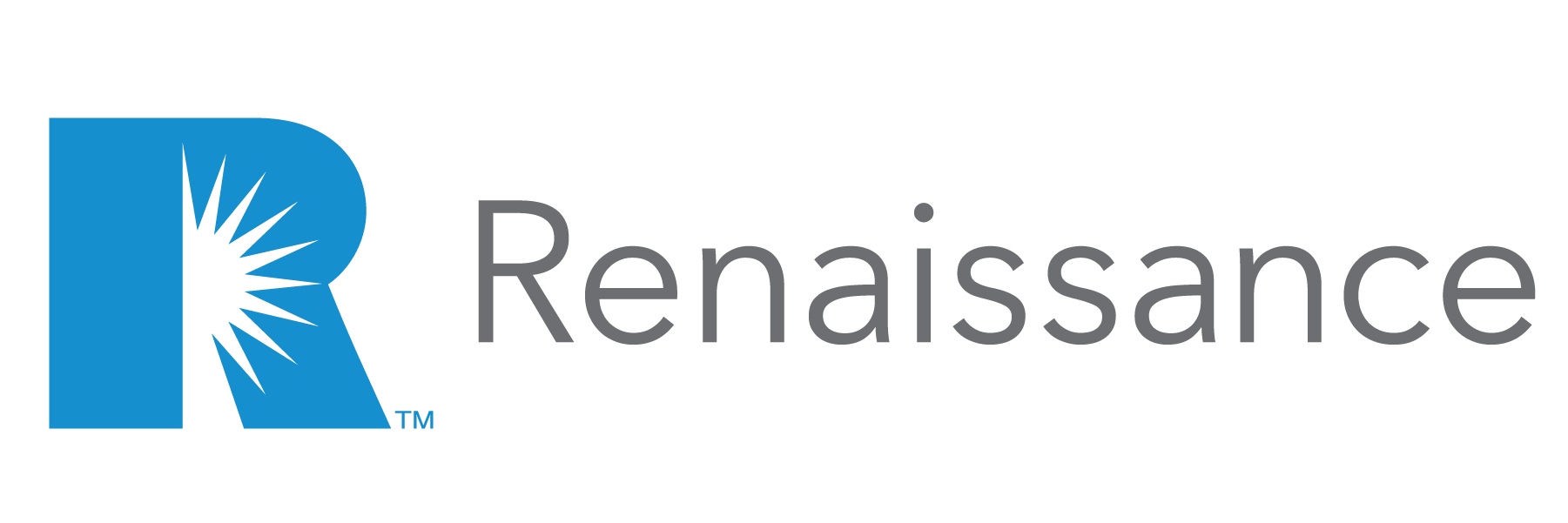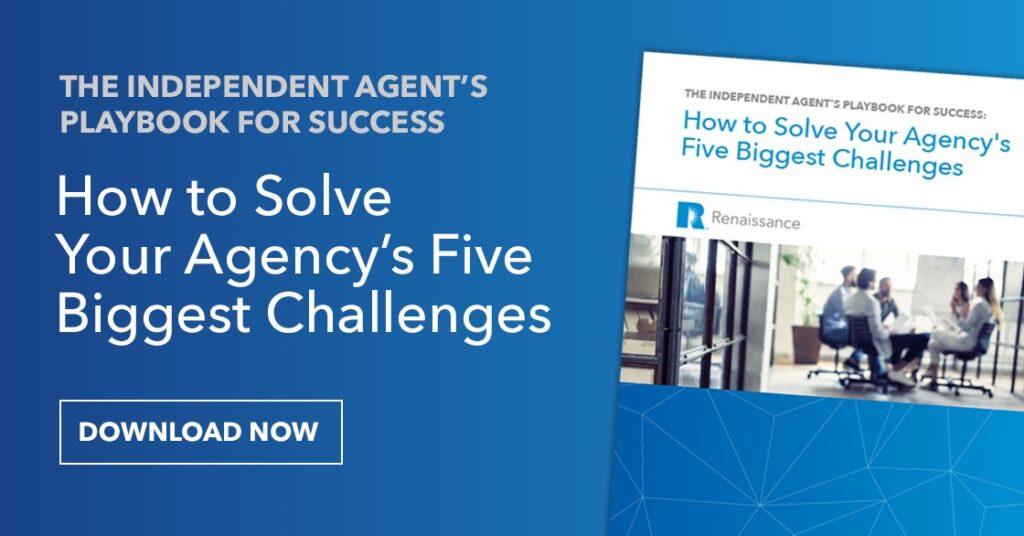Independent agencies that continuously strive to increase insurance sales are the ones that are continually investing in their success and their future.
Even the most successful agents can be challenged when it comes to finding new ways to increase insurance sales. The process of acquiring new business includes a wide-ranging series of tactics that are worth revisiting at every level of experience, whether you’ve been selling for three years or for three decades.
In order to increase their sales, however, there’s a fundamental question every independent agent must answer.
What is insurance selling?
Let’s first define “selling” as a concept. Selling isn’t just transactional, although that is the end goal; the process of selling is a wider term that encompasses everything from a casual introduction to promoting your brand, relationship building with leads and clients, claims service (where the rubber really hits the road), and renewals, to name just a few junctures.
Whether the target is a prospect or a longtime client, to a greater or lesser extent you actually never really stop selling to them, whether it’s your own value as a trusted advisor or the products you offer.
With all this in mind, let’s dive into our list of 15 steps to increasing insurance sales for independent agents.
1. Partner with other professionals
There are multiple benefits of partnering with other professionals, such as attorneys, financial advisors, or real estate agents, as these collaborations can lead to increased sales for your agency. Referrals are key to new business, and those three types of professionals are prime sources.
Aligning with certified public accountants (CPAs), for example, can be a valuable way for you to refer business to a client when they need financial advice or specific questions on protecting their assets – and CPAs can do the same for you when it comes to helping their clients service their insurance needs. The same can be said for aligning with attorneys who specialize in fields that overlap with the need for life insurance, such as family law and estate planning.
Establishing these reciprocal relationships can be less complicated than you think. Once you’ve done your due diligence, reach out by phone, email, or social media and introduce yourself as a local agent. Explain that you’re looking to connect with someone with experience in their field, and ask if they have a few minutes to chat or to answer a few questions.
You can do this over the phone, but meeting in person over a coffee or a cocktail will help you get a better feel for whether that person is someone you want to align with.
The goal here is to establish rapport with a professional to whom you can be an ally when their clients have a need they can’t solve, and vice versa. The more useful you can be to them and they to you, the more mutually beneficial that relationship will be.
2. Find your niche
Developing a niche in a particular line of insurance coverage (or the specific needs of one type of client) is a smart way to build your agency’s book of business.
Independent agents are aware of what types of businesses are prevalent in their area, and which ones offer the most potential for lead generation. Reputations are built on quality service, and in order to effectively target those customer niches, expertise is required. That means either developing it in-house, or bringing in an expert – and in either case, knowing which of your carrier partners have an appetite for insuring those niches is essential.
A solid growth strategy for your agency should reflect what’s going on in the market around you. Make it your mission to discover what the top 5 industries are in your area: are there a lot of contractors in your area, or hospital systems, or even car washes? Are many medical tech firms, early childhood development centers, or small manufacturers based nearby? Does your community host a good number of main street businesses, like bakeries, coffee shops, or dry cleaners?
After doing your research, you can make informed decisions on which types of clients you should pursue. Select one or several that work for your geography, focus on learning the unique characteristics of those industries, and know which carriers are looking to grow in those areas.
Developing such expertise requires commitment, and this can be particularly challenging for smaller agencies. If you’re going to consider a niche to become an expert in, it should be one you’re passionate about. While you do want to consider your carriers’ desire to write a certain type of business or the programs they’ve developed, at the end of the day you’ll do a better job of servicing clients if you’re personally invested in the ins and outs of their industry.
3. Reach your audience
It’s important to understand your target audience’s needs, preferences, and behaviors. This includes knowing both who your primary audience (your agency’s demographic) is, as well as how and where they want to engage with you. (Defining your target audience is especially critical when it comes to developing and offering niche expertise.)
Once you know precisely who you want to sell to, you can develop a communication strategy to reach them – and you can make it your business to be where they are.
If your agency accepts walk-ins, make that message clear to your customers in your signage, newsletters, e-mails, and texts. Bear in mind that many clients still prefer face-to-face conversations, especially when they require your counsel during a sensitive time in their lives.
Additionally, consider the following ways of communicating with customers:
- Text Message: Opt-in text messaging is one of the most reliable ways to send and receive messages quickly and communicate with customers.
- Social Media: The immediacy of messages delivered through social media apps appeals to many policyholders across multiple demographics, but is especially popular among younger clients.
- Phone: Many customers still prefer talking to a human being, especially when they have an established relationship with you. When in doubt, reach out.
- Videos: Demonstrate your knowledge and bolster your image as a trusted advisor by creating videos you can post on YouTube, Facebook, TikTok, and other social media. Leverage those popular platforms with periodic updates on topics of interest to your clients – and don’t be afraid to be authentic.
- Web Chat: AI technology powers the use of chatbots that can address common questions during off hours.
Keep in mind that less than 5% of all leads are actually ready to buy from you right away, and roughly half of all leads are unqualified – meaning that they will likely never have the interest or resources to become a customer.
Savvy agents know how to score leads effectively to determine which ones are worth nurturing. While each agency has its own process in place for rating leads, there are two essential factors that must be considered:
Would this lead be a good fit? Do you sell insurance products that would be appropriate or valuable to this person or organization, and what are the chances they will actually buy?
How engaged is the lead? Leads that have reached out to you or have spent time on your agency’s website or social media pages will have more potential than leads that come in as referrals or through cold calls.
Based on these two factors, most agencies will rate the lead between 0 and 100. Those leads that score between 75 and 100 are considered most likely to buy, and therefore worthy of nurturing.
The lead-nurturing process should include the following steps:
- Build your agency’s brand awareness and continually post positive customer-satisfaction reviews that your leads can easily see.
- Provide useful, valuable content (video or blogs) that demonstrates your expertise and informs your leads about your insurance products, fostering goodwill with your potential clients. When possible, provide content relevant to the appropriate stage of the buyer’s journey (awareness, consideration, and decision).
- Using automated marketing e-mails and autoresponders, follow up with every lead in a timely manner.
- Chart the activities of your lead and provide regular follow-up communications to keep them engaged with your agency.
5. Trigger the right emotions
There is an emotional quotient to every sale you make.
Have you ever provided a prospect a sales pitch that made all the logical sense in the world, but the prospect still didn’t buy? Chances are, they weren’t sufficiently connecting with you on an emotional level.
A prospect’s decision-making process is influenced by two elements: logic and emotion – and the balance of those two elements is different for every single person you serve. Therefore, it’s on you to assess the prospect as best you can, to meet their logical and emotional requirements while serving their insurance needs.
Some prospects require more emotion than logic when you’re selling to them; others may require the opposite approach. In either case, as a trusted advisor, the prospect expects you to explain their exposures (and the appropriate insurance solutions) to them in a way that tells them what they don’t know, and how your agency can help.
Using this type of informative, risk management-based sales process with prospects enables them to make their purchase decision based on emotions, while justifying their decisions with logic and facts.
6. Use Linkedin and its Ads platform
Create Compelling Ad Content:
- Determine which of your agency’s products/services you want to promote.
- Craft tight, engaging headlines that highlight the value of your offerings.
- Include brief, descriptive ad copy that explains the value of your products/services. (Answer the question: Why should they buy from you?)
- Include high-quality images or graphics relevant to insurance and your target audience.
Showcase Social Proof:
- To earn credibility with your audience, incorporate testimonials or success stories from your agency’s satisfied clients.
- Highlight any industry awards or affiliations that reflect your expertise.
Utilize Targeting Options:
- Leverage LinkedIn’s advanced targeting features, such as job-title targeting, company-size targeting, and others.
- Then, use retargeting to reach users who have previously engaged with your agency’s content.
7. Use retargeting ads and display advertising
LinkedIn retargeting ads enable you to reach LinkedIn users who may have previously interacted with your brand, but haven’t purchased from you.
Retargeting through the LinkedIn portal is an intuitive process that you can explore, depending on your budget. Here are the steps to how leads are retargeted on the site:
- A user sees your ad in their LinkedIn feed.
- The user clicks on the ad, and they are brought to your website.
- The user interacts with you, perhaps filling out a form in exchange for a PDF of content that’s of interest to them.
- The user then becomes a lead in your system.
- The lead’s history is stored in cookies and the data is sent to LinkedIn.
- LinkedIn then shows Retargeting ads to the lead.
8. Launch an e-mail campaign
E-mail campaigns provide your agency an excellent tool for personalized marketing to both prospects and current customers.
Messages sent to celebrate customers’ birthdays or offer seasonal weather-related tips on topics such as hurricane preparedness and icy pipes serve to remind current customers who is responsible for their insurance needs, and help keep your value as their trusted advisor top of mind. Likewise, personalized e-mails can be sent to reach out ahead of policy renewals can get ahead of clients’ efforts to shop around.
Direct mail campaigns are still useful, but are more effective when combined with follow-up e-mails. Remind your customers that they can save by bundling policies with you.
9. Implement your insurance sales strategies
Now it’s time to break down each of the strategies mentioned previously (partnering, lead nurturing, finding a niche, triggering the right emotions) into clear, actionable steps. Breaking down the “how” and the “why” of each these strategies for your staff will help considerably in securing their buy-in.
For example, if you’re using LinkedIn and its ads platform, be clear on which staff members will have responsibility for which task, and how that particular work will impact your agency’s results in time.
The more sales-centric strategies, such as developing a niche or lead scoring/nurturing, should be broken down with your salespeople into realistic steps they can take each day.
Be precise when explaining why each action is being taken, set goals for each staff member, and monitor your results.
10. Grow your customer base and retain it!
The aforementioned strategies are just some examples of ones that will help you grow your client base. Additional strategies include:
- Investing in a top-flight web site. Always bear in mind that the first experience that most new customers will have with your agency happens the instant they click on your link through a Google search. Once they do, you only have one chance for your digital storefront to make a knockout first impression. There are several essential ingredients that go into the ideal agency web site, and your agency would do well to know what those are.
- Continually improving your agency’s workflows. Busy agents will tell you that their biggest problem isn’t sourcing new leads; it’s servicing the customers they already have. Make it a practice to step back at least once a week and recognize what your most time-consuming tasks are. Are you spending way too much time on back-office tasks like billing and invoicing? Are you overwhelmed with administrative work? If so, there are solutions you might explore to help your agency move beyond transactional work and pursue true growth for your business.
- Setting goals for yourself and your staff. Invest a few minutes each day toward setting and writing your daily goals and to check in on your longer term goals. Then, evaluate your progress at monthly intervals. Hold your people accountable to the goals you set.
- Owning your market. In addition to running e-mail marketing campaigns, traditional advertising is still effective at the grassroots level. Determine the radius that you want to cover and set a budget. Local billboards, bus stop ads, and placemats at local eateries are among your options, as well as sponsoring a local youth sports team, community event, fundraiser, or local cleanups. All of these things engender goodwill within your community and raise your agency’s profile.
- Investing in your employees. One of the most common pain points among independent agents is their inability to attract and hire responsible, competent staff members. Yet, how many agency owners recognize the need to pay valuable employees well and train them? Seminars and training for your most valued people can pay dividends over time – and including them in industry/carrier-sponsored training events whenever possible is a smart strategy.
Customer retention is another goal that must remain top-of-mind. In order to ensure long-term client relationships, independent agents must:
- Keep in touch with your clients. Maintain a cadence of regular communication with your customers via phone, e-mail, mail, and texts. Remind your customers who it is that manages their insurance needs, and keep them abreast of any exposure trends that are relevant to them. Schedule regular check-ins and/or coverage reviews with your clients; remember that they are paying you for your personal touch. Plus, if you keep the lines of communication open, you’ll also be able to stay ahead of any potential issues that could cause you to lose their business.
- Know what motivates them. For example, for price-sensitive customers, share with them the numbers and the process behind how you found the policy you’re offering them. A little transparency goes a long way. With all customers, inform them well in advance when their premium will be increasing – and explain to them the reasons why it’s happening.
- Encourage referrals. Clients who discovered you via a referral are more likely to remain with your agency – and also more likely to refer you to others. Capitalize on this by establishing a referral program that offers a reward (such as a gift card) to clients who refer you to new customers.
- Offer auto-pay options, to avoid lapses or cancellations.
- Turn mono-line customers into multi-line clients every chance you get. The more policies a customer has with you, the less likely they are to look elsewhere.
11. Cross-sell your existing clients
Consider that when it comes to personal lines, the average independent agency’s book of business contains between 25% and 35% worth of clients who buy only one policy. It doesn’t have to be that way.
Turning mono-line customers into multi-line clients isn’t always easy, but it’s worth the investment of effort to try. Cross-selling those clients to multiple policies leads to better retention, increased customer loyalty and long-term revenue and premium growth.
However, cross-selling isn’t just a practice; it’s a mindset – an agency-wide strategy that principals must embrace and make a priority with their customer service reps in order for it to be truly successful.
There are two key steps that must be taken: changing your CSRs’ behavior, which can be achieved by clearly communicating to your sales staff that cross-selling is going to become a daily conscious effort among the team, and building out the process.
Financial incentives are one way to motivate your staff, as is gamification of the process. Creating a contest that awards the highest converter to multiple policies is one option that can yield successful results for your agency.
Additionally, a deeper dive on your agency’s data can help you target cross-sell opportunities within your customer base – and the more policies you have with a client, the greater your retention will be. Over time, small improvements on retention will add up to a huge impact on growth and profitability.
12. Become an educator and advisor, not just an agent
It’s one thing to service the insurance needs of your customers. It’s another thing entirely to be regarded by them as a trusted advisor.
The difference between the two perceptions is determined by your personal investment in the customer: how much time you can dedicate to checking in with them, learning about potential new exposures they might have, and offering risk-management solutions. You’re selling more than an insurance product: you’re selling your counsel – and in rare cases, that can include giving them advice that benefits the client more than it might benefit you.
You’re also selling your expertise – and even though there are so many hours in a day, it’s in your professional best interest to stay abreast of industry trends, policies, and regulations to effectively advise clients. Only then can you best tailor insurance solutions to their specific needs.
13. Sell based on value, not on price
It may sound harsh, but the truth is, anyone can sell on price alone.
However, those agents who sell mostly on price will soon lose that customer, simply because there’s always going to be someone else who will offer them a lower price than you can.
Here are some guidelines for selling on value:
- Make the risk “real” for the customer by talking abut the impact of the potential loss, should it occur. Frame the risk with real-life examples of past cases, and how their choices turned out for them.
- Explain the claims process, and how it will benefit them should the need arise. Sell them on the comfort of knowing that if something should go wrong and they have a claim, they’ll be a priority to you.
- Ask questions; don’t lecture. Remember that for most people, insurance isn’t something they think critically about, and are often led astray on price alone. Let the customer explain to you why they want to make certain coverage choices, and why. Then, you can advise them on whether or not those choices are actually in their best interest.
- Let them know that having an agent doesn’t make their insurance more expensive. Many consumers labor under the false assumption that this is the case; debunk this myth for them, emphasizing the value of your well-earned expertise.
14. Hone your storytelling skills
Real-life scenarios can illustrate the value of insurance in relatable ways. The key is possessing the ability to tell those stories in a way that the customer can relate to.
More often than not, the customer will be tempted to make insurance-purchase decisions based on what they believe they can afford – which will often lead to insufficient coverage (or even higher rates, if their various insurance needs are fulfilled by various companies).
It’s your responsibility to demonstrate for them how their purchase choices might have the potential to hurt them down the line. To do that, you have to be able to share real-life stories of how similar coverage decisions resulted in either positive or unfortunate outcomes. You don’t always have to name names, but doing so helps humanize your examples.
Throughout this process, continue to emphasize to the client your desire to remain available to them and continue to help them make informed decisions. Again, they’re paying for your counsel, their relationship with you – not just coverage.
15. Personalize the insurance experience
In a world where advertising is seemingly omnipresent, it’s important to deliver an insurance-buying experience that’s as personalized as possible.
E-mail campaigns give your agency an effective tool for personalized marketing to both prospects and current customers. While not every e-mail you send needs to be sales-based, it does need to be relationship-based; personalize every message your agency sends, regardless of whether a direct pitch is included.
Another great way to use e-mail in your agency marketing is to utilize Net Promoter Score customer surveys, in which your clients are asked to rate your agency’s efforts on a scale from 0 to 10. The results can not only reveal areas for improvement, but you can then ask those who rated you highly to share their thoughts in a Google review – which, remember, helps boost your ranking in search results.
Focus on realistic goals
Independent agents have a variety of strategies to consider in boosting their sales, and a finite amount of resources with which to do it. As the agency’s owner, you possess an informed sense of which steps from our list might work best for you and your staff.
When considering this list, focus on the options that you believe could be most effective for your agency, and concentrate your efforts on those specific steps. Develop a plan, set realistic, achievable goals for your people, and measure your results. Only then will you be able to determine which new avenues are best for growing your sales volume.
FAQs:
How do you promote insurance sales?
Promoting insurance sales is a multifaceted process that involves:
- Knowing how and where to reach your agency’s customers and prospects
- Nurturing sales leads
- Framing the risk properly for the client
- Implementing sales strategies
- Selling based on value, rather than price
- Focusing on and executing on realistic goals
Is it hard to make money in insurance sales?
Making money in property & casualty insurance sales requires one part perseverance, one part talent, and one part fearlessness. The degree to which you can be successful as an independent insurance agent is determined by several factors, including your location/region; your chosen niche; and your work ethic. While it is by no means easy, many independent P&C agents have become quite successful through years of building their books of business.
Knowing how to deal with and overcome rejection is essential to being a successful independent insurance agent. It is also critical to keep abreast of trends in the insurance industry and the market forces that shape it, in order to best manage your clients’ risk profiles.
Building a strong client base as an independent insurance agent involves (among others):
- The ability to make potential losses “real” for each client
- Tireless dedication to providing quality customer service
- Cross-selling your customers whenever possible, thus improving retention
- Continuous learning
What is Cross-Selling in Insurance?
Cross-selling is the process through which independent insurance agents sell additional coverage products to an existing customer. This practice is known to increase customer retention, in addition to yielding more premium dollars per client.
For example, an insurance client who carries a homeowners policy can be cross-sold or “upsold” to also carry an auto policy with the agent, often at a discount achieved through “bundling” their insurance coverage.
Financial incentives are one way to motivate an agency’s customer service representatives, as is gamification of the process. Creating a contest that awards the highest converter to multiple policies is an option that can yield successful results for your agency.







